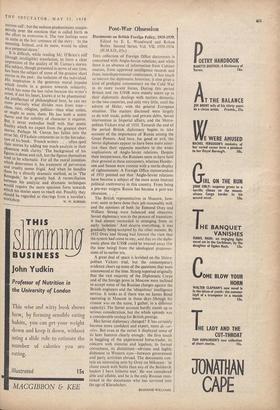Post-War Obsession
Documents on British Foreign Policy, 1919-1939. Edited by E. L. Woodward and Rohan Butler. Second Series. Vol. VII. 1929-1934. (H.M.S.O., 85s.) THis collection of Foreign Office documents is concerned with Anglo-Soviet relations, and while there is an absence of information from Cabinet sources, from approved intelligence records and from interdepartmental conferences, it has much to interest the diplomatic historian; it also gives a kind of proleptic commentary on the Cold War in its more recent forms. During this period Britain and the USSR were mainly taken up in their diplomatic dealings with matters domestic to the two countries, and only very little, until the advent of Hitler, with the general European situation. The matters discussed were largely to do with trade, public and private debts, Soviet intervention in Imperial affairs, and the Metro- politan Vickers trial of 1933. Towards the end of the period British diplomacy begins to take account of the importance of Russia among the Great Powers. And here, for good or evil, the Soviet diplomats appear to have been more atten- tive than their opposite numbers to the wider implications of Anglo-Soviet relations. Despite their inexperience, the Russians seem to have held their ground in these encounters, whereas Hender- son and Simon were content with a sterile; display of righteousness. A Foreign Office memorandum of 1931 pointed out that 'Anglo-Soviet relations have become a subject of the most acute internal political controversy in this country. From being a pre-war enigma Russia has become a post-war obsession. . .
The British representatives in Moscow, how-, ever, seem to have done their job reasonably well, and the opinions of both Sir Esmond Ovey and William Strang were .balanced and objective. Soviet diplomacy was in the process of transition; it had almost succeeded in emerging from its early 'isolation.' And despite everything, it was gradually being accepted by the other nations. By 1932 Ovey and Strang had formed the view that the system had come to stay, and that on the diplo- matic plane the USSR could be weaned away (for the time being) from the ideological preposses- sions of its earlier era.
A great deal of space is lavished on the Nletro- politan Vickers trial, but the contemporary evidence clears up none of the questions that went unanswered at the time. Strang reported originally that the vast majority of the Diplomatic Corps and of the foreign press in Moscow were inclined to accept some of the Russian charges against the British engineers and the 'ubiquitous' intelligence service. It looks as if there was no James Bond operating in Moscow in those days (though his creator was on the scene, I gather, in a different capacity). The Soviet account hardly stands up to serious consideration, but the whole episode was a considerable mishap for British prestige.
Has Soviet diplomacy changed? It has certainly become more confident and expert, more de car- riere. But even at the outset it displayed some of its later features clearly enough : the firm touch in haggling of the experienced horse-trader, its concern with minutia: and legalism, its formal correctness, its distinttion—obvious and highly dishonest to Western eyes—between government and party activities abroad. The documents con- tain an interesting note by Ovey on Mikoyan : 'in closer touch with Stalin than any of the Bolshevik leaders I have hitherto met.' He was considered able and affable, and he is the only Russian men- tioned in the documents who has survived into the age of Khrushchev.
DESMOND WILLIAMS


































 Previous page
Previous page